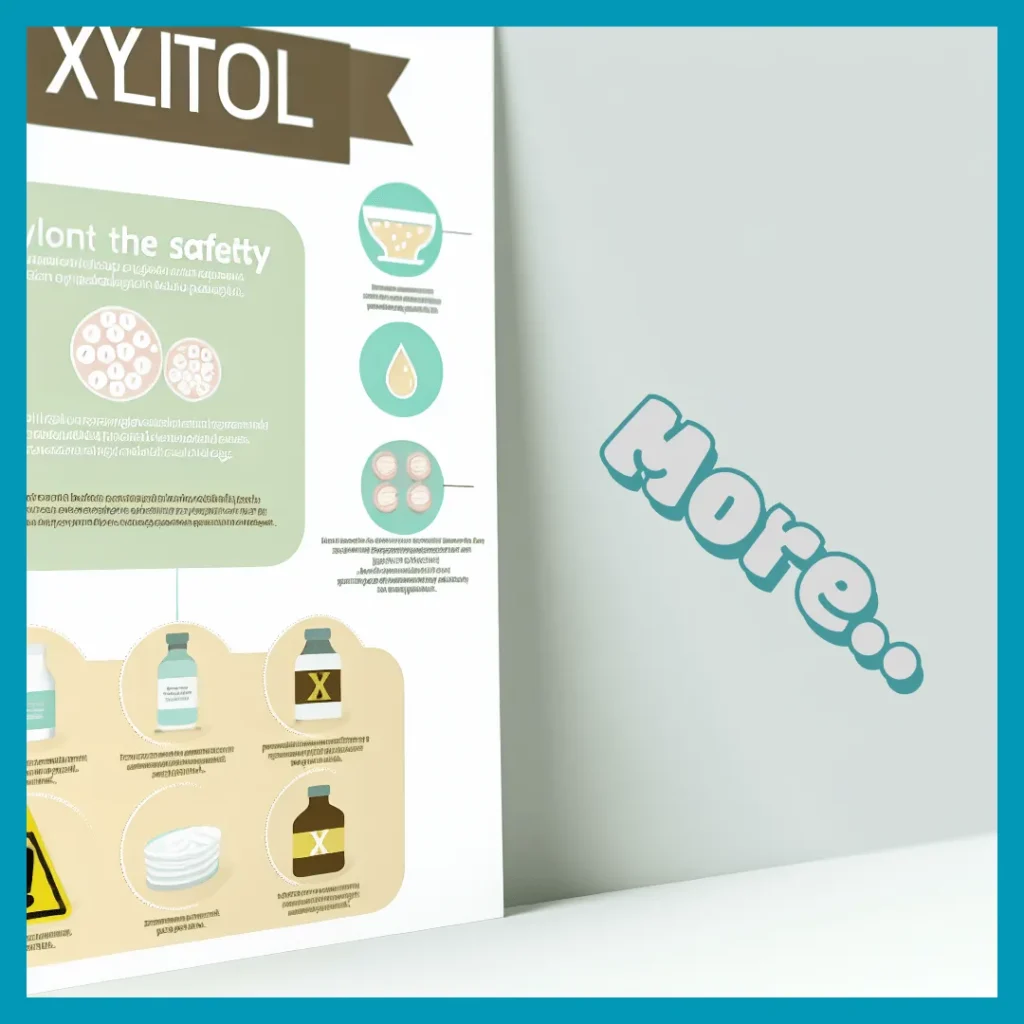Xylitol Safe to Take
In the ever-evolving quest for healthier living and dietary excellence, sweeteners stand at the forefront of many debates, discussions, and dilemmas.
Among these sweet substitutes, xylitol has emerged as a beacon of interest for those navigating the complex terrain of nutritional choices.
But amidst its growing popularity, a critical question lingers in the minds of health-conscious individuals: Is xylitol safe to take? This inquiry isn’t just about satisfying a sweet tooth; it’s about understanding the broader implications of incorporating xylitol into our daily lives.
As we delve into this topic, we’re embarking on more than just a cursory examination.
We are peeling back layers to reveal not only the aspects that make xylitol an attractive alternative to traditional sugars but also exploring its safety profile in depth.
This exploration is vital for anyone looking to make informed decisions about their health and wellness regimen.
Join us as we navigate through compelling evidence and expert insights, shedding light on how knowing if xylitol is safe could bring amazing benefits to your life.
From promoting dental health to aiding in weight loss, xylitol offers a range of advantages that make it a go-to sweetener for many individuals.
So whether you are diabetic, watching your sugar intake, or simply looking for a healthier alternative, read on to learn more about the wonders of xylitol and how it can benefit you.
Table of Contents Xylitol Safe to Take
Discover if xylitol is safe
When considering the safety of xylitol, it is important to examine the scientific evidence and expert opinions.
Xylitol is a naturally occurring sugar alcohol that is commonly used as a sugar substitute in various products.
It is well-known for its dental health benefits, as it has been shown to reduce the risk of tooth decay.
However, questions regarding the safety of xylitol have also been raised.
Some studies suggest that excessive consumption of xylitol may cause gastrointestinal discomfort, such as diarrhea and bloating.
Additionally, xylitol can be toxic to dogs, so it is crucial to keep products containing xylitol away from pets.
It is advisable to consult with healthcare professionals and consider individual health conditions before incorporating xylitol into your diet.
You can safely consume xylitol
When it comes to consuming xylitol, rest assured that it can be safely included in your diet.
Numerous scientific studies and expert opinions have supported the safety of xylitol as a sugar substitute.
Xylitol, especially when derived from birch sources, is considered a healthy alternative to sugar due to its low glycemic index and its limited impact on blood sugar levels.
It has also been shown to have dental health benefits, as it helps prevent tooth decay by reducing the growth of harmful bacteria in the mouth.
While excessive consumption of xylitol may cause gastrointestinal discomfort in some individuals, when consumed in moderation, xylitol poses no significant risks to your health.
However, it is important to keep in mind that xylitol can be toxic to dogs, so it is crucial to keep products containing xylitol out of their reach.
As always, it is advisable to consult with healthcare professionals to ensure that incorporating xylitol into your diet aligns with your individual health needs and conditions.
Learn about xylitol’s health benefits
Xylitol, a popular sugar substitute, offers a range of health benefits that make it a safe and healthy option for consumption.
One of the key concerns when it comes to using xylitol is its safety.
Rest assured that xylitol is indeed safe for you to take.
Extensive scientific research and expert opinions have consistently supported the safety of xylitol as a sugar alternative.
Derived from birch sources, xylitol is particularly considered a healthy choice due to its low glycemic index and minimal impact on blood sugar levels.
In fact, it has been found to have dental health benefits, helping to prevent tooth decay by reducing the growth of harmful bacteria in the mouth.
While excessive intake of xylitol may cause gastrointestinal discomfort in some individuals, consuming it in moderation poses no significant risks to your overall health.
It is important to note, however, that xylitol can be toxic to dogs, so it’s crucial to keep products containing xylitol out of their reach.
As always, it is advisable to consult with healthcare professionals to ensure that incorporating xylitol into your diet aligns with your specific health needs and conditions.
Understand the difference between types of xylitol
To fully understand the safety and health benefits of xylitol, it is important to differentiate between the various types available in the market.
The most commonly found types of xylitol are derived from birch trees, corn, and other plant sources.
Birch xylitol, in particular, is often considered the healthiest option due to its natural extraction process and minimal chemical involvement.
It is important to read labels and ensure that the xylitol product you choose is derived from high-quality sources.
Additionally, some xylitol products may contain additives or fillers that could potentially impact their overall safety and effectiveness.
Therefore, it is recommended to opt for pure, high-quality xylitol products to maximize its health benefits.
By understanding the differences between types of xylitol and choosing wisely, you can confidently incorporate this sugar substitute into your diet knowing that it is safe and beneficial for your overall well-being.
Xylitol from birch is healthy
When it comes to xylitol, choosing the type derived from birch trees can be a healthy choice for your well-being.
Birch xylitol is known for its natural extraction process and minimal chemical involvement, making it a preferred option among health-conscious individuals.
It is considered safe for consumption and has been extensively studied for its positive effects on dental health, as it inhibits the growth of harmful bacteria in the mouth.
Additionally, birch xylitol has a low glycemic index, which means it does not cause a rapid spike in blood sugar levels.
This makes it a suitable alternative for individuals who need to manage their blood sugar levels, such as those with diabetes.
When selecting xylitol products, ensure that they are derived from high-quality sources and free from additives or fillers that may compromise their health benefits.
By choosing birch xylitol and incorporating it into your diet, you can enjoy the sweetness without compromising your health.
Avoid xylitol from corn
To ensure your safety and well-being, it is advisable to avoid xylitol derived from corn.
Unlike birch xylitol, which undergoes a natural extraction process, xylitol from corn often involves more chemical processing and may contain additives or fillers that could compromise its health benefits.
Furthermore, there is a possibility of genetically modified corn being used in the production of xylitol, which can raise concerns about potential adverse effects on your health.
By opting for birch xylitol instead, you can confidently enjoy its natural and minimal chemical involvement, promoting a healthier alternative for your dietary needs.
So, when considering xylitol options, it is crucial to prioritize your well-being and choose the safer option of birch xylitol over the potentially questionable xylitol derived from corn.
Protect yourself from xylitol’s dangers
To protect yourself from the potential dangers of xylitol, it is important to be aware of its potential negative effects.
While xylitol is generally considered safe for human consumption, it is essential to use it in moderation.
Consuming excessive amounts of xylitol can cause digestive issues such as diarrhea and bloating.
Additionally, xylitol is toxic to dogs and should never be given to them as it can lead to a sudden drop in blood sugar levels and liver damage.
Always be cautious when storing xylitol-containing products to prevent accidental ingestion by pets.
If you have any concerns about the use of xylitol, it is recommended to consult with a healthcare professional or a registered dietitian to determine if it is suitable for your specific health needs.
Stay informed and make informed decisions when it comes to xylitol to ensure your well-being.
Xylitol can improve your health
Incorporating xylitol into your diet can offer potential health benefits.
Xylitol is a natural sugar substitute that is derived from plant sources, such as birch trees.
It has a low glycemic index, which means it does not cause a significant spike in blood sugar levels.
This makes it a suitable option for individuals with diabetes or those who are monitoring their blood sugar levels.
Xylitol also promotes dental health by reducing the risk of tooth decay and cavities.
It inhibits the growth of harmful bacteria in the mouth, preventing plaque formation.
Additionally, xylitol has fewer calories compared to regular sugar, making it a suitable choice for those looking to manage their weight.
However, as with any food or ingredient, it is important to use xylitol in moderation and consult with a healthcare professional to determine if it is appropriate for your specific health needs.
Overall, knowing if xylitol is safe to take can have many amazing benefits for your health and wellbeing.
From promoting dental health to helping manage diabetes, this natural sweetener has a lot to offer.
By understanding its properties and potential risks, you can make informed decisions about incorporating it into your diet and enjoying its benefits.
Remember to always consult with a healthcare professional before making any changes to your diet or health routine.
With knowledge and caution, xylitol can be a valuable addition to your lifestyle.
FAQ
What are the potential health benefits of consuming xylitol?
Consuming xylitol can potentially benefit your oral health by preventing cavities and reducing plaque formation.
It has a lower glycemic index compared to sugar, making it a suitable alternative for diabetic individuals.
Xylitol also has fewer calories than sugar, which may aid in weight management.
However, consuming large amounts of xylitol can cause digestive issues such as bloating and diarrhea.
It is important to use xylitol in moderation to avoid negative side effects.
How does xylitol compare to other sweeteners in terms of safety and effectiveness?
When it comes to safety and effectiveness, xylitol stands out among sweeteners.
Its natural origins and low glycemic index make it a safer alternative to artificial sweeteners.
Xylitol is also beneficial for dental health, unlike sugar which can contribute to cavities.
Its similar taste and sweetness to sugar make it an effective substitute in various recipes and products.
Overall, xylitol proves to be a superior choice in terms of both safety and effectiveness compared to other sweeteners.
Are there any potential risks or side effects associated with consuming xylitol?
Yes, there are potential risks and side effects associated with consuming xylitol.
Some people may experience digestive issues such as bloating, gas, and diarrhea.
Ingesting large amounts of xylitol can also lead to a drop in blood sugar levels, which may be dangerous for individuals with diabetes.
Additionally, xylitol can be toxic to dogs and should be kept away from them.
It is important to consume xylitol in moderation and be aware of these potential risks when incorporating it into your diet.
How can individuals determine if they are allergic or sensitive to xylitol?
To determine if you are allergic or sensitive to xylitol, you can start by carefully monitoring your body’s reactions after consuming products containing xylitol.
Look out for symptoms like itching, swelling, hives, or difficulty breathing.
It’s also advisable to consult with a healthcare professional or allergist for proper testing and diagnosis to confirm any allergies or sensitivities to xylitol.
Remember to read food labels and avoid products with xylitol if you suspect you may have an allergic reaction.
What are some common products that contain xylitol and how can individuals incorporate it into their diet safely?
Common products that contain xylitol include sugar-free gum, toothpaste, and some candies.
To incorporate xylitol into your diet safely, you can use it as a sugar substitute in baking or cooking, add it to your coffee or tea, or choose xylitol-sweetened products instead of those sweetened with sugar.
Remember to consume xylitol in moderation, as excessive intake can cause digestive issues.
Be sure to read labels and choose products that contain xylitol as an ingredient to enjoy its benefits in a healthy way.







